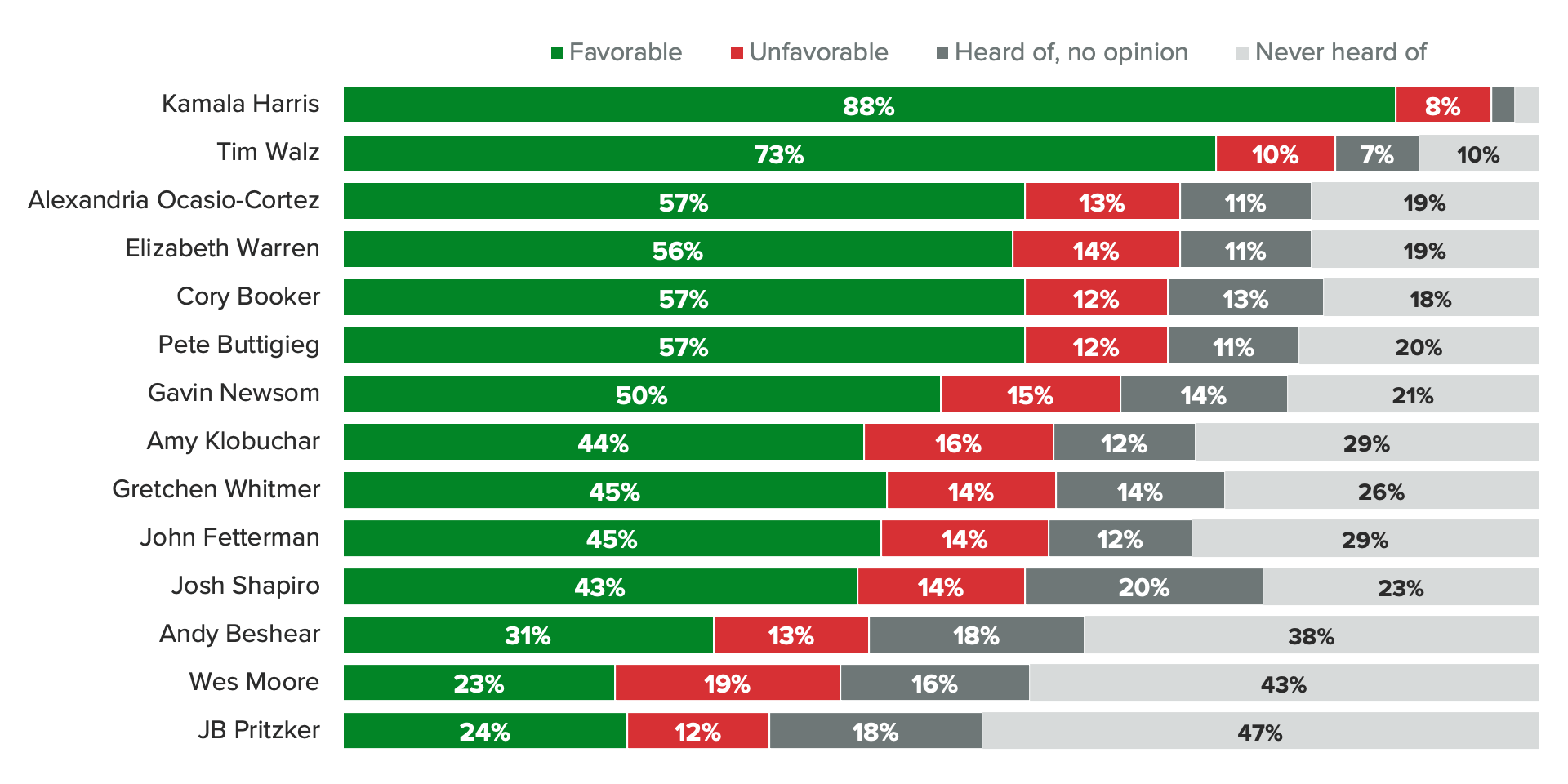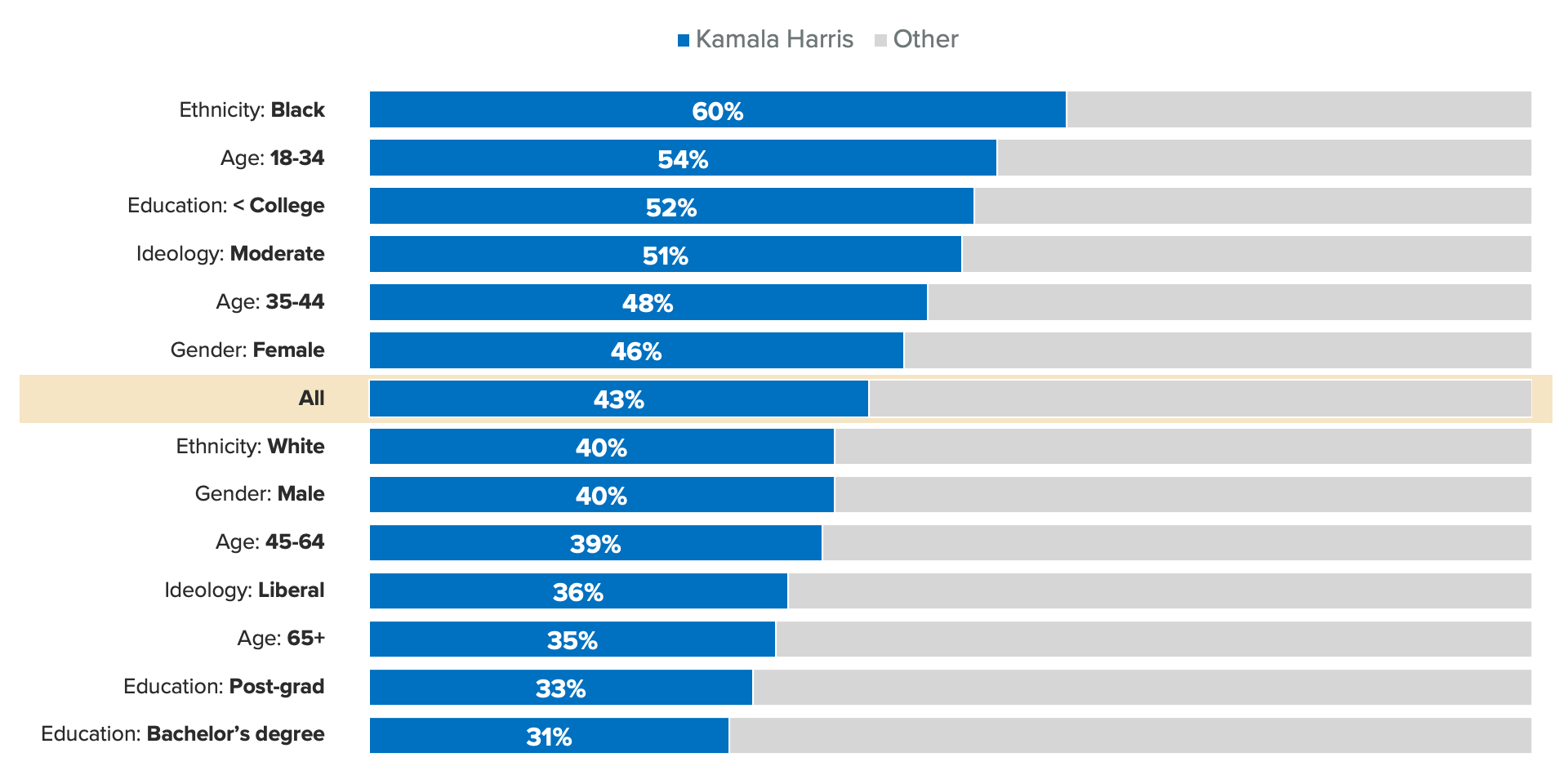Harris Is the Very Early Leader in the Race for the 2028 Democratic Nomination

Key Takeaways
43% of Democrats and Democratic-leaning independents nationwide said they would vote for Harris if the party’s 2028 presidential primary were held today, while Transportation Secretary Pete Buttigieg has 9% support in the early look followed by California Gov. Gavin Newsom with 8%.
The extremely hypothetical 2028 Democratic presidential contenders considered in our survey are all quite popular with their party’s base, but plenty of voters haven’t heard much about many of them. For example, more than 2 in 5 potential primary voters either have no opinion or haven’t heard of Michigan Gov. Gretchen Whitmer or Pennsylvania Sen. John Fetterman (41%).
The bulk of her own party’s voters (62%) said she should play a “major role” in the Democratic Party. That is roughly equivalent to the share of Republicans who said the same of Trump in early November 2022 — his best showing on the question prior to his third campaign launch.
Sign up to get the latest data and analysis on how business, politics and economics intersect around the world.
Vice President Kamala Harris’ late entry into the 2024 presidential race and subsequent loss to President-elect Donald Trump has left the Democratic Party facing a leadership vacuum as various coalitions within it look to assign blame. But as our data makes clear, Harris still wields considerable influence in the party and will be a force to be reckoned with — should she seek the nomination four years down the road.
According to a new Morning Consult survey, 43% of Democrats and Democratic-leaning independents nationwide said they would vote for Harris if the party’s 2028 presidential primary were held today. It’s more support than Biden received in our 2018 test of a hypothetical list of candidates or our tracking of his 2020 primary contest until the field winnowed at the very end.
Harris leads other potential 2028 contenders

None of the 13 other names tested in the survey broke double-digit support. Transportation Secretary Pete Buttigieg — who as a relative unknown ran a formidable campaign for the nomination in 2020 — has 9% support in the early look, followed by California Gov. Gavin Newsom with 8%.
Harris is clearly benefiting from universal name recognition among voters, though that doesn’t explain all of her support. Minnesota Gov. Tim Walz, her running mate this year and the second-most known and popular potential candidate in the mix, was backed by just 7% of potential Democratic primary voters for the 2028 nomination.
Many in the Democratic electorate haven’t formed opinions about potential 2028 candidates

The extremely hypothetical 2028 Democratic presidential contenders considered in our survey, which is certainly subject to change over the next few years, are all quite popular with their party’s base, but plenty of voters haven’t heard much about many of the politicians either.
For example, more than 2 in 5 potential primary voters either have no opinion or haven’t heard of Michigan Gov. Gretchen Whitmer or Pennsylvania Sen. John Fetterman (41%), not to mention such ambitious governors as Andy Beshear of Kentucky (56%), Wes Moore of Maryland (58%) or JB Pritzker (64%), all of whom are trying to use their state-level perches to raise their profiles nationwide.
Harris’ own advantages over the field at this extremely early point are driven by backing from younger voters in the Democratic coalition, along with nonwhites, moderates and the lesser-schooled.
Harris has solid support among Black potential primary voters

Harris is backed by majorities of Democrats or Democratic-leaning independents who are Black (60%), ages 18-34 (54%) and those without college degrees (52%). Just about a third of those with college or postgraduate degrees said they would support Harris, along with 2 in 5 white voters and men within the party’s potential 2028 electorate.
The bottom line
While this survey obviously isn’t predictive of any 2028 outcome given the timing, it sheds light on opinion within the Democratic base at a moment when influential Democrats in Washington and around the country are debating how they’ll position themselves to take on Trump’s presidency.
On one hand, Harris’support is smaller than Trump’s was among Republicans (53%) immediately after he lost four years ago, and is only slightly higher than the 40% nadir we clocked for him following the Jan. 6 Capitol attack.
On the other hand, the bulk of her own party’s voters (62%) said she should play a “major role” in the Democratic Party. That is roughly equivalent to the share of Republicans who said the same of Trump in early November 2022 — his best showing on the question that we measured before he launched his third presidential campaign later that month.
This at a minimum buys Harris a seat at the table as chatter increases about opportunities such as governor of California, where she served previously as senator and attorney general. Her prospects for 2028 are obviously much more difficult to parse, especially given the roster of relatively low-profile talent the party has developed in recent cycles.
How these contenders position themselves with regard to Trump, who ultimately gets the blame for this year’s failure and how voters react to those dynamics will decide what the next iteration of Democratic leadership looks like.
Eli Yokley is Morning Consult’s U.S. politics analyst. Eli joined Morning Consult in 2016 from Roll Call, where he reported on House and Senate campaigns after five years of covering state-level politics in the Show Me State while studying at the University of Missouri in Columbia, including contributions to The New York Times, Politico and The Daily Beast. Follow him on Twitter @eyokley. Interested in connecting with Eli to discuss his analysis or for a media engagement or speaking opportunity? Email [email protected].